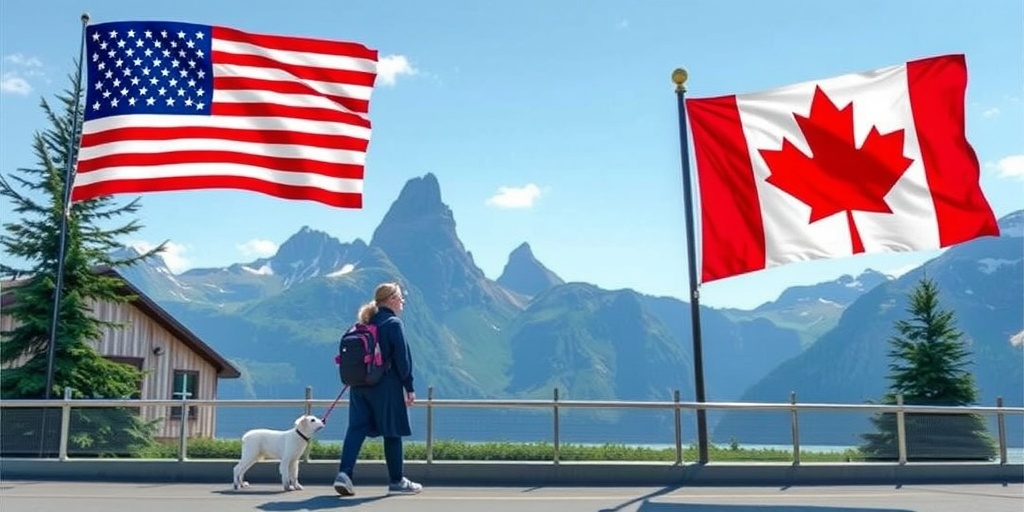Now Reading: U.S. to Enforce Visitor Registration Law with Canada
-
01
U.S. to Enforce Visitor Registration Law with Canada
U.S. to Enforce Visitor Registration Law with Canada

New Registration Requirement for Canadians Visiting the United States: What You Need to Know
The United States is set to implement a new regulatory measure requiring Canadians who plan to visit for 30 days or longer to register with U.S. authorities. This decision has been confirmed by two Canadian officials who requested anonymity as they are not authorized to speak publicly on the matter. The change is rooted in existing immigration law, which mandates that foreign nationals aged 14 and older must register and undergo fingerprinting if they intend to stay in the United States for an extended period.
Historically, this legal requirement has not been consistently enforced for Canadians entering the country through land borders. However, the current administration signals a shift in this practice. On his first day in office, President Trump issued an executive order that aims to enforce compliance with this provision, emphasizing that individuals who have not registered prior to their visit must do so or face potential civil and criminal consequences.
Canadian officials have reported receiving this notice, which has also been covered by major news outlets, including ABC News. As the policy takes shape, it is expected to change the dynamics of cross-border travel between Canada and the U.S., which has traditionally seen a high volume of visitors.
Responses from the Department of Homeland Security (DHS) and U.S. Citizenship and Immigration Services (USCIS) have not been immediate, raising concerns among Canadians regarding the practical aspects of the new requirement. In subsequent communications, USCIS indicated that guidelines for registration would soon be provided, helping those who are unfamiliar with the process to navigate their obligations under the law.
This initiative is part of the Trump administration’s broader strategy that has already included escalating tariffs on Canadian imports. The tension between the two neighboring countries has been escalating over recent months, particularly after the imposition of a 25 percent tariff on various Canadian goods. Although some goods received temporary relief from these tariffs, significant levies remain in place, especially on steel and aluminum products.
The conflict has intensified further with the Trump administration’s announcement of a doubling of tariffs on these metal imports, following retaliatory measures by Ontario. The provincial government imposed additional charges on electricity exports to the U.S., signaling that the trade disputes between the nations are far from resolved.
Notably, the executive order concerning the registration of foreign nationals extends beyond Canadian visitors, affecting undocumented immigrants aged 14 and older within the U.S. who have not registered. Non-compliance with this registration can lead to criminal prosecution, adding another layer of concern for those affected by these regulations.
As the policy unfolds, exemptions have been communicated for certain groups, including green card holders, individuals already undergoing deportation proceedings, and those who have entered the U.S. on valid visas. This clarification is essential for many, as it distinguishes between those who will be subject to the new requirements and those who are otherwise protected by their legal status.
While the implications of this policy are becoming clearer, the logistics of how Canadians will register remain uncertain. Questions abound concerning the process, documentation required for registration, and the locations where Canadians can fulfill these obligations. The DHS has assured that further information will be made available soon, yet the lack of immediate details raises concerns among travelers and immigration experts alike.
Cross-border travel has always played a significant role in the relationship between the U.S. and Canada, with millions of Canadians visiting the U.S. each year for tourism, business, and family reasons. The potential complications introduced by this new requirement could discourage some visitors from making the trip, underscoring the need for clear communication from U.S. authorities.
In conclusion, the U.S. government’s decision to enforce a registration requirement for Canadians visiting for 30 days or more marks a significant policy shift that could have far-reaching effects on travel and immigration between the two nations. As both the U.S. and Canadian governments navigate the complexities of this change, it will be crucial for travelers to stay informed and prepared for any additional requirements that may impact their plans. The evolving landscape of cross-border travel will certainly require close attention from both governments to maintain the strong ties that have existed for decades.
Stay Informed With the Latest & Most Important News
Previous Post
Next Post
-
 01New technology breakthrough has everyone talking right now
01New technology breakthrough has everyone talking right now -
 02Unbelievable life hack everyone needs to try today
02Unbelievable life hack everyone needs to try today -
 03Fascinating discovery found buried deep beneath the ocean
03Fascinating discovery found buried deep beneath the ocean -
 04Man invents genius device that solves everyday problems
04Man invents genius device that solves everyday problems -
 05Shocking discovery that changes what we know forever
05Shocking discovery that changes what we know forever -
 06Internet goes wild over celebrity’s unexpected fashion choice
06Internet goes wild over celebrity’s unexpected fashion choice -
 07Rare animal sighting stuns scientists and wildlife lovers
07Rare animal sighting stuns scientists and wildlife lovers



















